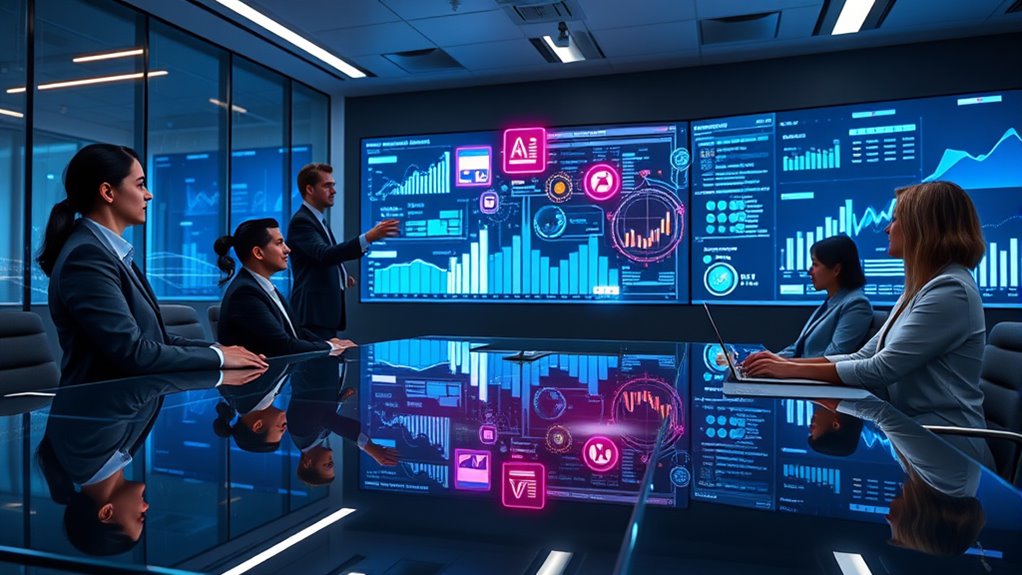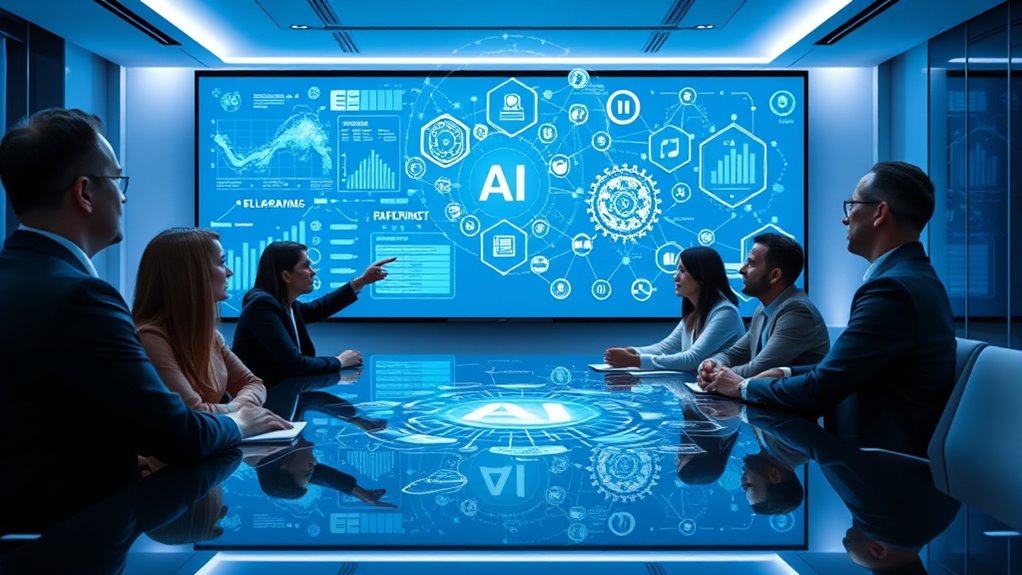Integrating AI into your business operations gives you a clear competitive edge by boosting efficiency, enhancing customer personalization, and streamlining supply chains. AI helps you analyze vast data to deliver tailored offers, automate logistics, and respond quickly to market changes. This not only cuts costs but also strengthens customer loyalty and differentiates you from competitors. As you explore further, you’ll discover how these advancements can position your business as innovative and future-ready.
Key Takeaways
- AI-driven personalization enhances customer engagement and loyalty by delivering tailored content and recommendations.
- Automating supply chain processes with AI reduces costs, minimizes errors, and improves responsiveness to market changes.
- Real-time data analysis enables businesses to adapt quickly, maintaining a competitive edge in dynamic markets.
- Integrating AI improves operational efficiency, leading to faster decision-making and optimized resource allocation.
- Leveraging AI showcases innovation, differentiating businesses from competitors and strengthening market positioning.

Artificial intelligence is transforming how businesses operate, enabling them to streamline processes, make data-driven decisions, and enhance customer experiences. One of the most impactful ways AI achieves this is through customer personalization. Instead of relying on generic marketing strategies, AI analyzes vast amounts of customer data to tailor interactions, offers, and recommendations to individual preferences. This level of personalization makes your customers feel valued and understood, boosting loyalty and conversion rates. Whether it’s personalized product suggestions on your website or targeted email campaigns, AI helps you deliver timely, relevant content that resonates. By understanding customer behaviors and anticipating needs, you create a more engaging shopping experience, setting your business apart from competitors that use broad, one-size-fits-all approaches. Leveraging AI content clusters can further enhance your content strategy by creating interconnected, targeted content groups that improve your search engine rankings and audience engagement.
AI-driven personalization enhances customer loyalty and engagement through tailored interactions and targeted content.
Another critical area where AI provides a competitive edge is supply chain automation. Managing a supply chain involves complex, interconnected processes that often suffer from delays, errors, and inefficiencies. AI-powered systems can forecast demand more accurately by analyzing historical data, market trends, and external factors like weather or economic shifts. This enables you to optimize inventory levels, reduce stockouts, and cut excess stock, saving costs and improving overall efficiency. Supply chain automation powered by AI also streamlines logistics, automating tasks such as route planning, delivery scheduling, and warehouse management. These systems can adapt in real-time to disruptions, rerouting shipments or adjusting inventory automatically, minimizing delays and keeping your operations running smoothly. The ability to automate and optimize your supply chain not only improves operational efficiency but also enhances your ability to respond quickly to market changes, giving you a significant advantage over competitors still relying on manual or outdated processes.
Furthermore, integrating AI into your business operations facilitates a seamless flow of information across departments. This connectivity means sales, marketing, logistics, and customer service teams can access real-time insights and collaborate more effectively. For example, customer feedback collected through AI-driven analytics can inform product development or service improvements immediately. This holistic approach ensures your business remains agile and responsive to market demands, strengthening your position in a competitive landscape.
In essence, leveraging AI for customer personalization and supply chain automation equips you with tools to operate more efficiently, serve your customers better, and adapt rapidly to changing conditions. These advances don’t just improve your bottom line—they also position your business as innovative and customer-focused, key qualities for sustained success in today’s fast-paced, tech-driven marketplace. Embracing AI integration now guarantees you stay ahead of the curve, turning technological advancements into tangible competitive advantages.
Frequently Asked Questions
How Does AI Integration Impact Employee Job Roles and Responsibilities?
You’ll find that AI integration transforms your job roles and responsibilities by driving workforce transformation and emphasizing skill development. As AI handles routine tasks, you shift focus to strategic, creative, or interpersonal activities. This change requires you to learn new skills and adapt quickly. Embracing workforce transformation helps you stay relevant, making your role more impactful and ensuring continuous growth alongside technological advancements.
What Are the Initial Costs Associated With AI Implementation?
You might think AI implementation costs are prohibitive, but a thorough cost analysis helps you understand the initial expenses. These costs include software, hardware, and training. Vendor selection is vital; choosing the right partner ensures you get a solution that fits your budget and needs. While upfront costs may seem high, investing wisely can lead to significant long-term gains, making the initial investment worthwhile.
How Can Small Businesses Afford AI Integration?
You can make AI integration affordable by exploring scalable solutions tailored to your budget. Start with cloud-based services and affordable tools that grow with your business. Focus on scalable strategies that allow you to implement AI gradually, reducing upfront costs and minimizing risk. Additionally, seek out partnerships or grants that support small businesses adopting new technology. This approach helps you harness AI’s benefits without overspending.
What Are Common Challenges Faced During AI Adoption?
Integrating AI is like steering through a tricky labyrinth—you’ll face hurdles like data privacy concerns and ethical considerations. You might worry about how to protect customer info or guarantee fair decision-making. These challenges can feel overwhelming, but with careful planning, transparent policies, and ongoing oversight, you can steer through smoothly. Embrace these obstacles as opportunities to strengthen trust and build a responsible, innovative AI-driven business.
How Is AI Compliance Regulated Across Different Industries?
You need to understand that AI compliance is regulated through various industry-specific regulatory frameworks, which emphasize AI ethics. These frameworks guide how you develop, deploy, and manage AI systems responsibly. Regulations may differ across sectors like healthcare, finance, or retail, but all aim to guarantee transparency, fairness, and accountability. Staying updated on these rules helps you avoid legal issues and build trust with clients, demonstrating your commitment to ethical AI practices.
Conclusion
By integrating AI into your business operations, you gain a competitive edge that can transform your company’s future. Embrace change and stay ahead of the curve, because as they say, “The early bird catches the worm.” Don’t wait for competitors to catch up—take action now and open new opportunities for growth, efficiency, and innovation. Remember, those who adapt quickly often reap the greatest rewards in today’s fast-paced world.









